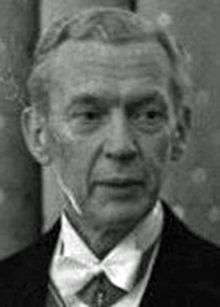Maurice Couve de Murville
| Maurice Couve de Murville | |
|---|---|
 | |
| Prime Minister of France | |
|
In office 10 July 1968 – 20 June 1969 | |
| President |
Charles de Gaulle Alain Poher (interim) |
| Preceded by | Georges Pompidou |
| Succeeded by | Jacques Chaban-Delmas |
| Minister of Foreign Affairs | |
|
In office 1 June 1958 – 30 May 1968 | |
| President |
René Coty Charles de Gaulle |
| Prime Minister |
Michel Debre Georges Pompidou |
| Preceded by | Rene Pleven |
| Succeeded by | Michel Debre |
| Personal details | |
| Born |
Maurice Couve 24 January 1907 Reims, France |
| Died |
24 December 1999 (aged 92) Paris, France |
| Political party | UDR |
| Spouse(s) | Jacqueline Schweisguth |
| Children |
Juliette Dorothée Béatrice |
| Occupation |
Military Diplomat Civil Servant Politician |
| Religion | Protestant[1][2] |

Maurice Couve de Murville (French: [moʁis kuv də myʁvil]; 24 January 1907 – 24 December 1999) was a French diplomat and politician who was Minister of Foreign Affairs from 1958 to 1968 and Prime Minister from 1968 to 1969 under the presidency of General de Gaulle.
He was born Maurice Couve (his father acquired the name de Murville in 1925[3]) in Reims and died in Paris at the age of 92 from natural causes.
Life
Couve de Murville joined the corps of finance inspectors in 1930, and in 1940 became Director of External Finances of the Vichy régime, in which capacity he sat at the armistice council of Wiesbaden. In March 1943, after the American landing in North Africa, he was one of the few senior officials of Vichy to join the Free French. He left for Algiers, via Spain, where he joined General Henri Giraud. On 7 June 1943, he was named commissioner of finance of the French Committee of National Liberation (CFLN). A few months later, he joined General Charles de Gaulle. In February 1945, he became a member of the Provisional Government of the French Republic (GPRF) with the rank of ambassador attached to the Italian government.
After the war, he occupied several posts as French Ambassador, in Cairo (1950 to 1954), at NATO (1954), in Washington (1955 to 1956) and in Bonn (1956 to 1958). When General de Gaulle returned to power in 1958, he became Foreign Minister, a post he retained for ten years until the reshuffle that followed the events of May 1968 where he replaced Finance minister Michel Debré, keeping this post only a short time: very soon after the elections, he became a transitional Prime Minister, replacing Georges Pompidou. The following year he was succeeded by Jacques Chaban-Delmas.
Couve de Murville continued his political career first as a UDR deputy, then RPR deputy for Paris until 1986, then as a senator until 1995.
Maurice Couve de Murville (bishop), the Roman Catholic Archbishop Emeritus of Birmingham (1929–2007), was his cousin.
Published works
- Une politique étrangère, 1958–1969 (1971). ISBN unknown
- Le Monde en face (1989). ISBN 2-259-02222-7
Political career
Governmental functions
Prime minister : 1968–1969
Minister of Foreign Affairs : 1958–1968
Minister of Economy and Finance : May–July 1968
Chairman of the Foreign Affairs Committee of the National Assembly 1973-1981.
Electoral mandates
Member of the National Assembly of France for Paris : June 1968 (He leaves his seat because he is minister) / 1973–1986
Senator of Paris : 1986–1995
Couve de Murville's Government
The cabinet from 10 July 1968 – 22 June 1969
- Maurice Couve de Murville – Prime Minister
- Michel Debré – Minister of Foreign Affairs
- Pierre Messmer – Minister of Armies
- Raymond Marcellin – Minister of the Interior, Public Health, and Population
- François-Xavier Ortoli – Minister of Economy and Finance
- André Bettencourt – Minister of Industry
- Joseph Fontanet – Minister of Labour, Employment, and Population
- René Capitant – Minister of Justice
- Edgar Faure – Minister of National Education
- Henri Duvillard – Minister of Veterans and War Victims
- André Malraux – Minister of Cultural Affairs
- Robert Boulin – Minister of Agriculture
- Albin Chalandon – Minister of Equipment and Housing
- Jean Chamant – Minister of Transport
- Roger Frey – Minister of Relations with Parliament
- Yves Guéna – Minister of Posts and Telecommunications
- Maurice Schumann – Minister of Social Affairs
On 28 April 1969 – Jean-Marcel Jeanneney succeeded Capitant as interim Minister of Justice.
References
External links
- A film clip "Longines Chronoscope with Maurice Couve de Murville" is available at the Internet Archive
| Political offices | ||
|---|---|---|
| Preceded by André Diethelm |
Free French Commissioner for Finance 1943 |
Succeeded by Pierre Mendès-France |
| Preceded by René Pleven |
Minister of Foreign Affairs 1958–1968 |
Succeeded by Michel Debré |
| Preceded by Michel Debré |
Minister of Economy and Finance 1968 |
Succeeded by François-Xavier Ortoli |
| Preceded by Georges Pompidou |
Prime Minister of France 1968–1969 |
Succeeded by Jacques Chaban-Delmas |